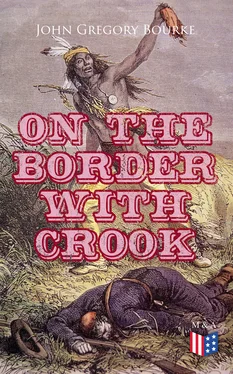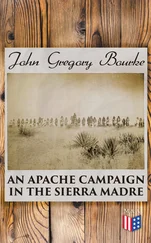Duffield was too much exhausted from loss of blood to retain his hold upon the rascal whom he had first seized, so that Justice did not succeed in laying her hands upon any of the band. When Duffield recovered sufficiently to be able to reappear on the streets, he did not seem to be the same man. He no longer took pleasure in rows, but acted like one who had had enough of battles, and was willing to live at peace with his fellow-men. Unfortunately, if one acquire the reputation of being “a bad man” on the frontier, it will stick to him for a generation after he has sown his wild oats, and is trying to bring about a rotation of crops.
Duffield was killed at Tombstone ten years since, not far from the Contention Mine, by a young man named Holmes, who had taken up a claim in which Duffield asserted an interest. The moment he saw Duffield approaching he levelled a shot-gun upon him, and warned him not to move a foot, and upon Duffield’s still advancing a few paces he filled him full of buckshot, and the coroner’s jury, without leaving their seats, returned a verdict of justifiable homicide, because the old, old Duffield, who was “on the shoot,” was still remembered, and the new man, who had turned over a new leaf and was trying to lead a new life, was still a stranger in the land.
Peace to his ashes!
There were military as well as non-military men in Tucson, and although the following incident did not occur under my personal observation, and was one of those stories that “leak out,” I tell it as filling in a gap in the description of life as it was in Arizona twenty and twenty-five years ago. All the persons concerned were boarders at the “Shoo Fly,” and all are now dead, or out of service years and years ago.
The first was the old field officer whom, for want of a better name, every one called “Old Uncle Billy N——.” He had met with a grievous misfortune, and lost one of his eyes, but bore his trouble with stoicism and without complaint. During a brief visit to Boston, he had arranged with an oculist and optician to have made for him three glass eyes. “But I don’t clearly understand what you want with so many,” said the Boston man.
“Well, I’ll tell you,” replied the son of Mars. “You see, I want one for use when I’m sober, one when I’m drunk, and one when I’m p—— d—— drunk.”
The glass eyes were soon ready to meet the varying conditions of the colonel’s life, and gave the old man the liveliest satisfaction. Not long after his return to the bracing climate of Tucson he made the round of the gaming-tables at the Feast of Saint Augustine, which was then in full blast, and happened to “copper” the ace, when he should have bet “straight,” and bet on the queen when that fickle lady was refusing the smile of her countenance to all her admirers. It was a gloomy day for the colonel when he awaked to find himself almost without a dollar, and no paymaster to be expected from San Francisco for a couple of months. A brilliant thought struck him; he would economize by sending back to Boston two of his stock of glass eyes, which he did not really need, as the “sober” and “tolerably drunk” ones had never been used, and ought to fetch something of a price at second-hand.
The Boston dealer, however, curtly refused to negotiate a sale, saying that he did not do business in that way, and, as if to add insult to injury, enclosed the two eyes in a loose sheet of paper, which was inscribed with a pathetic story about “The Drunkard Saved.” It took at least a dozen rounds of drinks before the colonel could drown, his wrath, and satisfy the inquiries of condoling friends who had learned of the brutal treatment to which he had been subjected.
A great friend of the colonel’s was Al. Garrett, who in stature was his elder’s antithesis, being as short and wiry as the colonel was large and heavy. Garrett was an extremely good-hearted youngster, and one of the best horsemen in the whole army. His admirers used to claim that he could ride anything with four legs to it, from a tarantula to a megatherium. Semig, the third of the trio, was a Viennese, a very cultivated man, a graduate in medicine, an excellent musician, a graceful dancer, well versed in modern languages, and well educated in every respect. He was the post surgeon at Camp Crittenden, sixty miles to the south of Tucson, but was temporarily at the latter place.
He and Garrett and Uncle Billy were making the best of their way home from supper at the “Shoo Fly” late one evening, and had started to cut across lots after passing the “Plaza.”
There were no fences, no covers—nothing at all to prevent pedestrians from falling into some one of the innumerable abandoned wells which were to be met with in every block, and it need surprise no one to be told that in the heat of argument about some trivial matter the worthy medical officer, who was walking in the middle, fell down plump some fifteen or twenty feet, landing in a more or less bruised condition upon a pile of adobes and pieces of rock at the bottom.
Garrett and his elderly companion lurched against each other and continued the discussion, oblivious of the withdrawal of their companion, who from his station at the bottom of the pit, like another Joseph, was bawling for his heartless brothers to return and take him out. After his voice failed he bethought him of his revolver, which he drew from hip, and with which he blazed away, attracting the attention of a party of Mexicans returning from a dance, who too hastily concluded that Semig was a “Gringo” spoiling for a fight, whereupon they gave him their best services in rolling down upon him great pieces of adobe, which imparted renewed vigor to Semig’s vocalization and finally awakened the Mexicans to a suspicion of the true state of the case.
The poor doctor never heard the last of his mishap, and very likely was glad to receive the order which transferred him to the Modoc War, wherein he received the wounds of which he afterward died. He showed wonderful coolness in the Lava Beds, and even after the Indians had wounded him in the shoulder and he had been ordered off the field, he refused to leave the wounded under fire until a second shot broke his leg and knocked him senseless.
Associated with Semig in my recollection is the name of young Sherwood, a First Lieutenant in the Twenty-first Infantry, who met his death in the same campaign. He was a man of the best impulses, bright, brave, and generous, and a general favorite.
This rather undersized gentleman coming down the street is a man with a history—perhaps it might be perfectly correct to say with two or three histories. He is Don Estevan Ochoa, one of the most enterprising merchants, as he is admitted to be one of the coolest and bravest men, in all the southwestern country. He has a handsome face, a keen black eye, a quick, business-like air, with very polished and courteous manners.
During the war the Southern leaders thought they would establish a chain of posts across the continent from Texas to California, and one of their first movements was to send a brigade of Texans to occupy Tucson. The commanding general—Turner by name—sent for Don Estevan and told him that he had been informed that he was an outspoken sympathizer with the cause of the Union, but he hoped that Ochoa would see that the Union was a thing of the past, and reconcile himself to the new state of affairs, and take the oath to the Confederacy, and thus relieve the new commander from the disagreeable responsibility of confiscating his property and setting him adrift outside his lines.
Don Estevan never hesitated a moment. He was not that kind of a man. His reply was perfectly courteous, as I am told all the talk on the part of the Confederate officer had been. Ochoa owed all he had in the world to the Government of the United States, and it would be impossible for him to take an oath of fidelity to any hostile power or party. When would General Turner wish him to leave?
Читать дальше












